| March 1, 2018
Graves Yamaha YZF-R3 | RACER TEST | Graves Yamaha YZF-R3 | Stepping Stones – The Graves/ Yamaha YZF-R3 support program is the perfect opportunity for racers looking to make a splash in MotoAmerica.
Going professional road racing is serious business. To be competitive, a rider must have it all—raw speed, tactical race craft, and the ability to develop motorcycle that is capable of winning. Missing one of those? Well, your career might be over before it even begins.
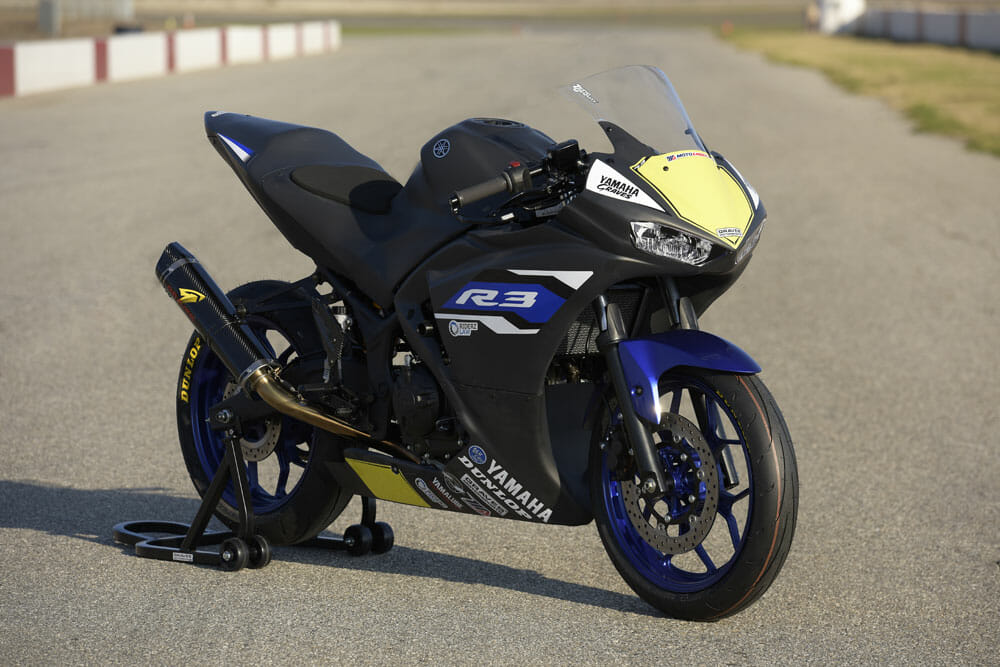
This is the harsh reality of motorcycle racing, which is especially unfair to the youngsters coming through the ranks. These kids might possess the speed and tactics on track, but without the experience and funding to experiment with various parts and setups needed for development, reaching their dream is nearly impossible.
But what if there was an option to totally eliminate the trials and tribulations of developing a motorcycle and only have to focus on racing at the big stage? Now, imagine there’s an opportunity to knock on the door of one of the most successful teams in the American paddock, purchase a turn-key race bike from them, receive technical support to ensure that bike is always competitive, and have a four-time superbike champion as your rider coach. Ah, yes. It’s possible.
Enter the Graves/ Yamaha YZF-R3 Support Program.
This project has been built by Graves Racing Services—a Los Angeles-based shop that is responsible for dominating middleweight road racing over the last decade—in collaboration with Yamaha to provide young racers and their teams a gateway into real professional racing at the MotoAmerica Junior Cup level.
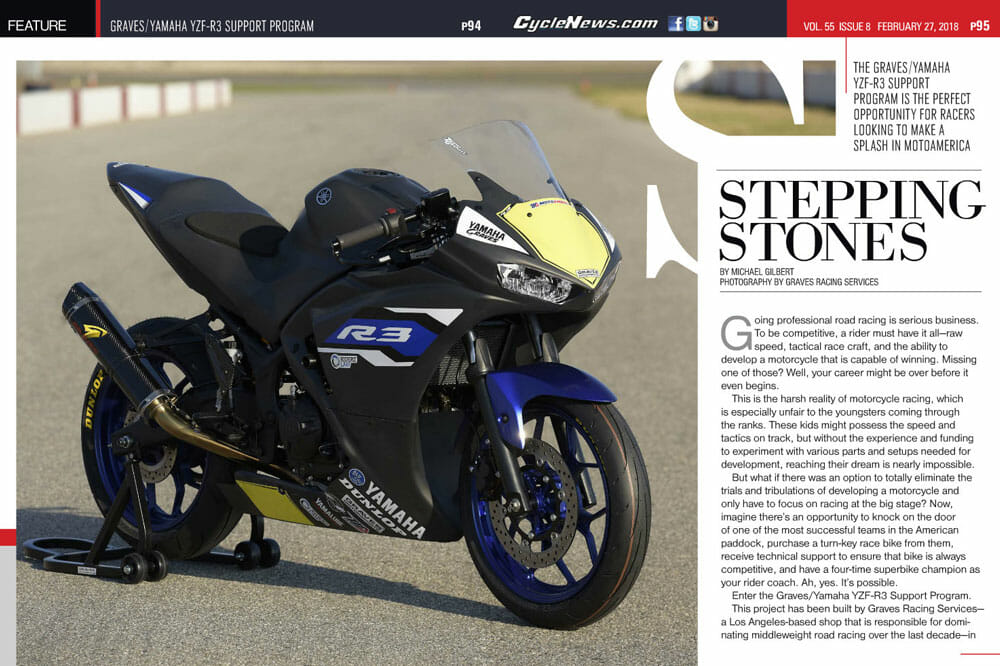
By Michael Gilbert
Photography by Graves Racing Services
The level of expertise and knowledge behind the program is what Chuck Graves, founder and president of Graves Racing Services, says will help increase the standards in the American road race paddock.
“What we provide for support, I see it is a way to raise the talent pool of riders and teams in the American paddock,” he says. “This is the least expensive way that carries the most amount of energy.”
The cost of admission to the Graves/Yamaha Support Program is $15,000, which buys you a complete, race-ready YZF-R3 that has been built in-house by the Graves team. The transformation of the motorcycle begins with technicians stripping it down to the frame before rebuilding it with all the proper aftermarket parts required to be competitive in the MotoAmerica Junior Cup—a class designed for 14 to 25-year-old racers competing on 250cc to 500cc lightweight production machines. From there, the build list includes top-shelf components like fork cartridges and a rear shock from Öhlins, custom racing bodywork, brake lines, a re-flashed Flash Tune ECU, a HM Quickshifter, an AIM Solo 2 lap timer, adjustable Graves rearsets, and a Graves full-system exhaust, among other bits.
What is special about the program, however, isn’t necessarily the list of parts that come equipped to the bike, but rather the attention to detail and technical support that comes included with the purchase of the motorcycle.
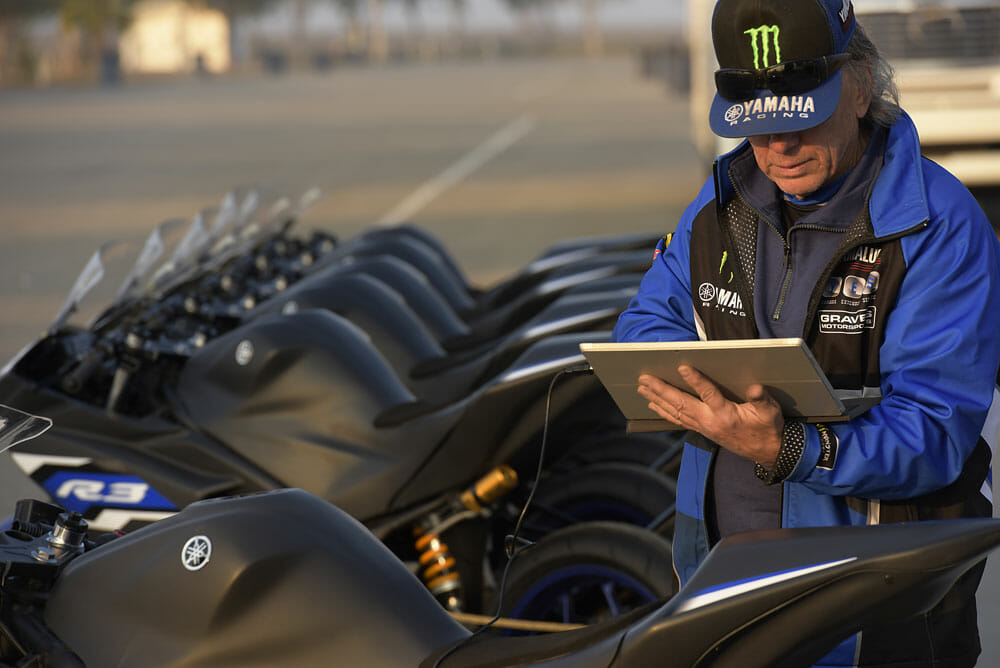 The real value behind the program is the amount of technical support received by Graves Racing Services. The team will offer every included rider support, including suggested suspension settings, during every MotoAmerica Weekend.
The real value behind the program is the amount of technical support received by Graves Racing Services. The team will offer every included rider support, including suggested suspension settings, during every MotoAmerica Weekend.
During the course of each MotoAmerica race weekend, the Graves technical staff is fully accessible to teams for advice and will provide suggested baseline settings that are specific to each racetrack. Those suggestions are no small assets either, with these technicians being the same guys responsible for the Graves’ highly successful 600 supersport program. It’s the same crew that will analyze the digital set up sheet from each rider, before coming to conclusion of a window of adjustment to work within. This eliminates the possibility of a rider straying too far in the wrong direction, and will help keep the youngsters on competitive equipment. Throw in the fact that Yamaha has enlisted four-time AMA Superbike Champion Josh Hayes to act as a rider coach for the program, and there’s no denying that amount of support these young riders will have is worth every penny.
When it comes down to the facts, no matter how much experience you might have either as a rider or a wrenching on bikes as a “racer dad,” the Graves/Yamaha YZF-R3 Support Program has something to offer you. This program means business, and is designed help elevate the level of our sport in the United States. Whether if I was a kid wanting to make my splash in the MotoAmerica Junior Cup or a father wanting the best possible scenario for my kid, I’d be doing whatever it takes to join this program. Chuck Graves and his crew have it all together, and I expect their bikes to be at the front of the pack from the very first race of the season.
Like Graves said, “In the end, if you can start off with an already-developed motorcycle, it’s the fastest and easiest way to raise the level of talent.”
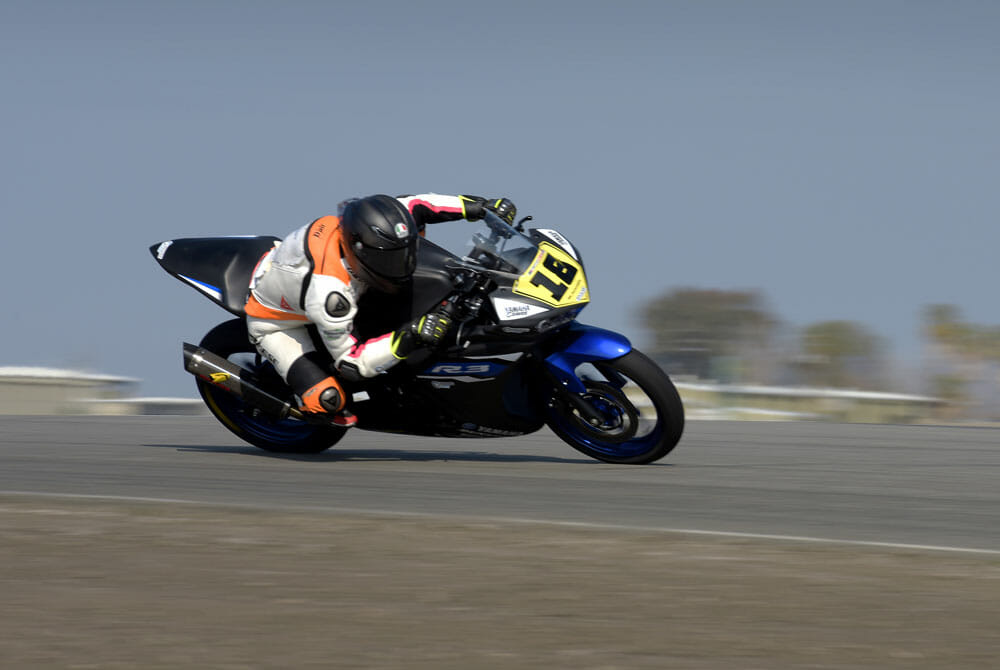 Jackson Blackmon, one of nine young riders to be a part of the program, spent his day getting comfortable with his new motorcycle. These kids are quick!
Jackson Blackmon, one of nine young riders to be a part of the program, spent his day getting comfortable with his new motorcycle. These kids are quick!
From the Hot Seat
As part of the Junior Cup Program, Graves held a two-day orientation test for the class of 2018 riders at Buttonwillow Raceway outside of Bakersfield, California, where we had the chance to spin some laps on a race-prepped Yamaha YZF-R3 for ourselves.
The two days kicked off with a technical briefing for the riders and crews, which explained all the ins and outs of the Graves Racing Services’ R3. Details are important to the Graves team, and it showed during the briefing. It’s all about extracting the most performance possible, while keeping the bike in tip-top condition.
While the team members briefed us, as well as the Graves technical staff, Josh Hayes took the 2018 Junior Cup Support Program riders on a track-walk around the 2.5-mile long circuit. The Mississippi Madman is wise with his words, but tips for the youngsters were short and simple. Hayes explained how he picks out reference points, utilizes what the racetrack has to offer, and goes about strategy for a weekend. This is a selling point for the Graves program. The MotoAmerica Junior Cup is designed to make motorcycles as evenly matched as possible, and even with shiny-new R3s, winning and losing is totally rider dependent. That said, having a coach as knowledgeable as Josh Hayes, could mean the difference between being in the front, or being just another midpack rider.
And now, it’s time to ride. Throwing a leg over the Graves R3 presents a feeling that’s common with all professionally built race bikes. It feels complete, with every piece having its place. It’s a simple machine, and doesn’t come with a lot to fiddle with. In fact, it’s not even outfitted with a pit-lane speed limiter.
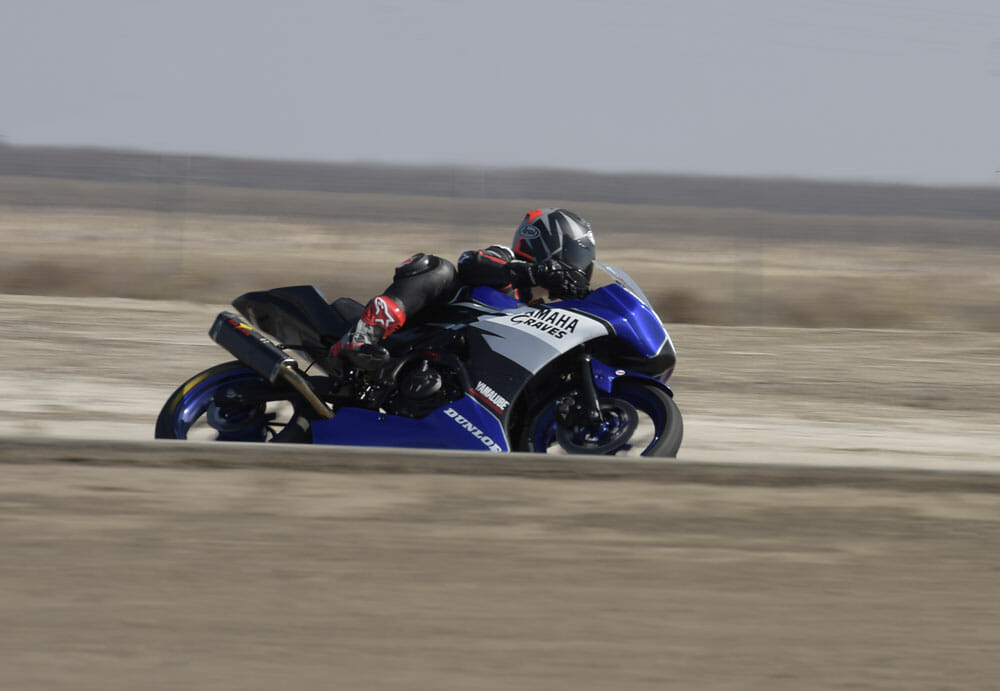 We were fortunate to spend time aboard the Graves Racing Services developmental YZF-R3 at Buttonwillow. The experience was an eye-opener to how many lessons can be learned on a lightweight motorcycle.
We were fortunate to spend time aboard the Graves Racing Services developmental YZF-R3 at Buttonwillow. The experience was an eye-opener to how many lessons can be learned on a lightweight motorcycle.
On track, the R3 shows that its true potential, especially in the technical sections. The Yamaha is lightweight, and begs to be flicked through side-to-side transitions where it can prove its agility. Thanks to the Öhlins front fork cartridges and rear shock, gone is the unsettled ride that’s typical with small bikes and instead is a feeling of stability and confidence. Get into a corner with a little too much speed? You might feel the front end begin to tuck underneath you, but the motorcycle is light enough to be picked up by your knee. Forgiving is the word.
Every tiny movement affects the overall lap time on a bike like this, which means there’s no allowing for a lapse in concentration. It’s all about staying tucked in as low as possible to reduce drag, while still doing what is necessary to get the motorcycle to handle properly around the racetrack.
Quick lap times are achieved by maximizing roll speed and using the brakes as little as possible, not by running into corners deep and squirting off the exit. This is a lesson that will pay off for younger rider down the line. Besides, a claimed 42 horsepower will only go so far.
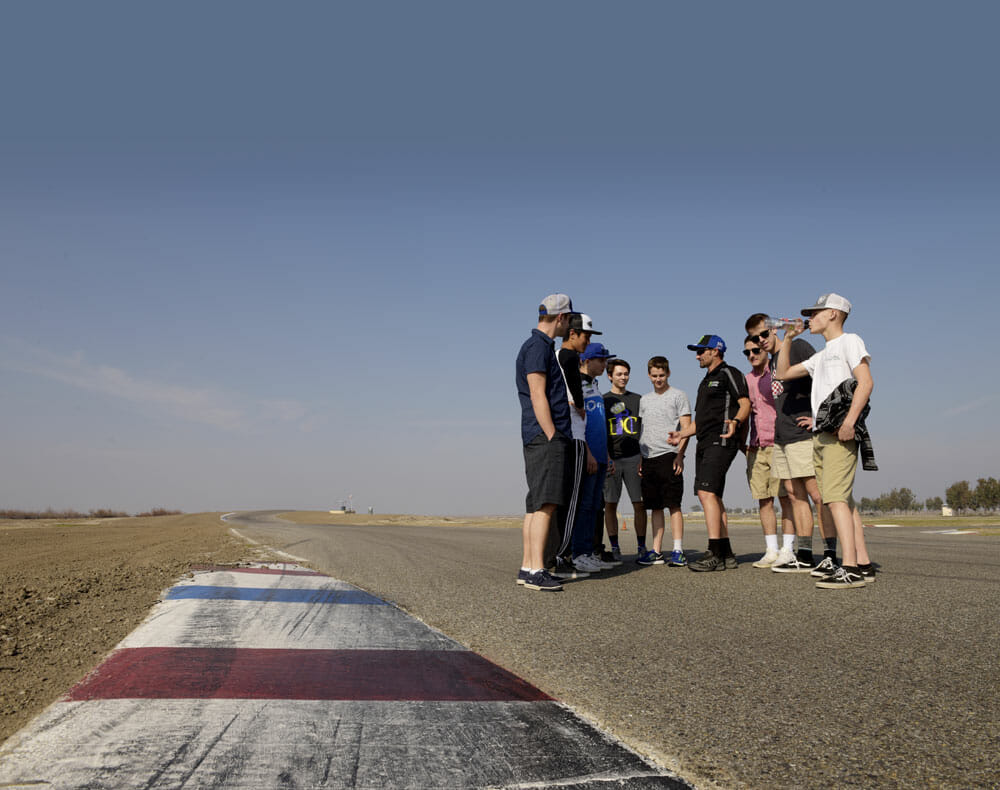 Four-time Superbike champion Josh Hayes will act as the rider coach for the Graves/ Yamaha Support program. He took the riders out for a track walk and offered tips about how to get around Buttonwillow quickly.
Four-time Superbike champion Josh Hayes will act as the rider coach for the Graves/ Yamaha Support program. He took the riders out for a track walk and offered tips about how to get around Buttonwillow quickly.
To say that we had fun on the little Graves R3 would be an understatement. Learning to extract as much time out of a small bike like this is a challenge, but also one of the best experiences you can have on a motorcycle. The lessons learned are huge, and the risk is low—making this motorcycle the perfect tool for any up-and-coming racer. Every session we stepped off the bike with a huge smile, and can guarantee that the kids of the Graves/Yamaha YZF-R3 Support Program will too. CN
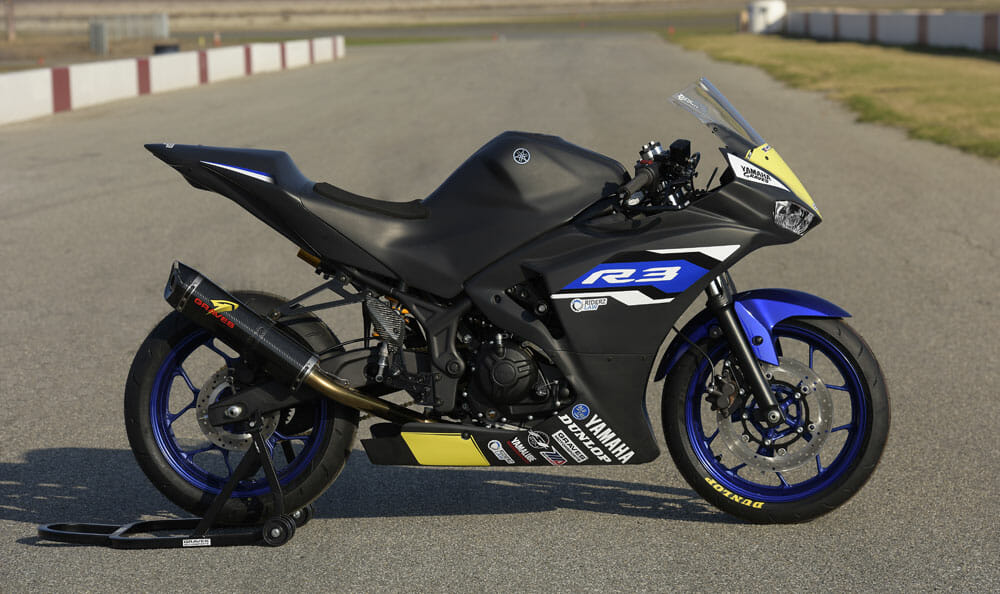
The Details
Each of the YZF-R3s built for the Graves/Yamaha Support Program are built with the same attention to detail that’s put into the team’s 600 Supersport program, which has dominated American racing for the better part of a decade. Each bike is stripped down to its bare bones, and then reassembled with only the best parts possible. Take a look here at some of the components that separate the Graves R3 from the rest:
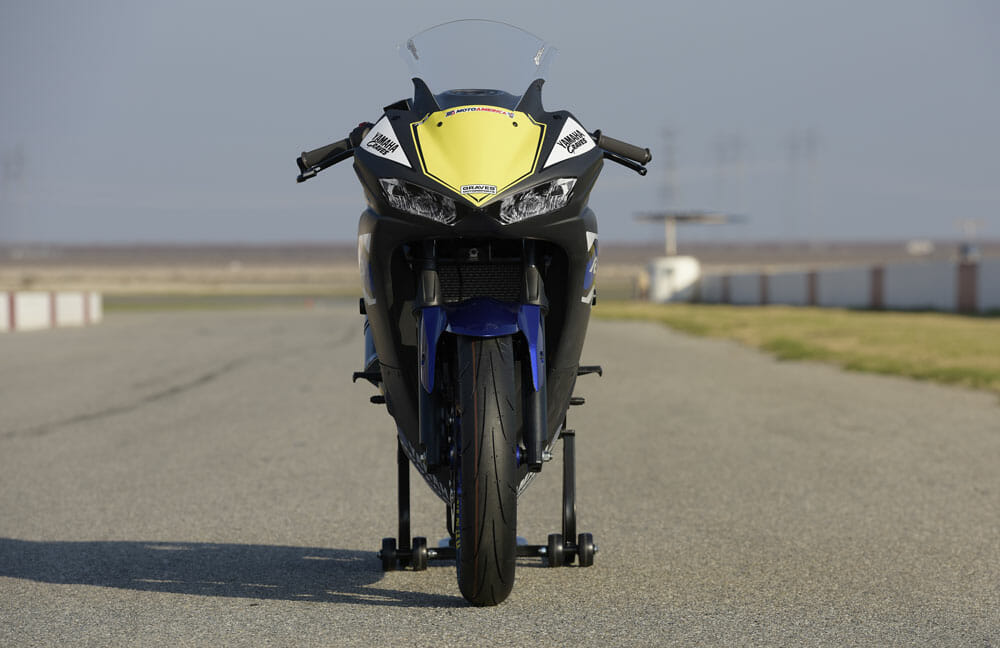 Each Graves YZF-R3 is fitted with a set of Dunlop Q3+ tires, which is the designated spec tire for the MotoAmerica Junior Cup class in 2018.
Each Graves YZF-R3 is fitted with a set of Dunlop Q3+ tires, which is the designated spec tire for the MotoAmerica Junior Cup class in 2018.
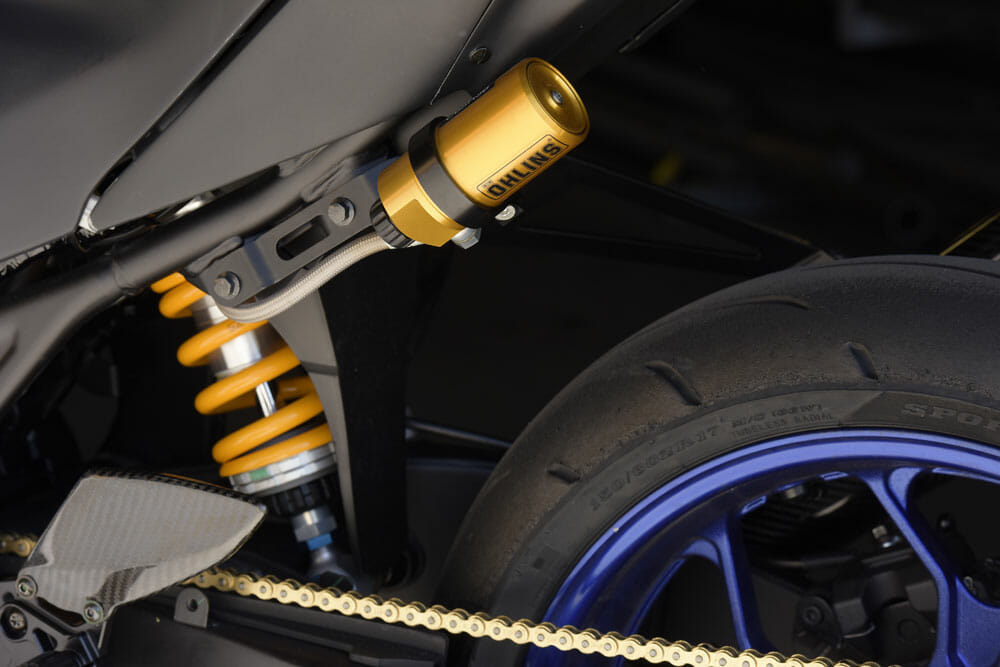 The Öhlins rear shock that’s equipped to the R3 boosts stability and feel at full lean, especially in comparison to the stock equipment on an off-the-showroom-floor motorcycle.
The Öhlins rear shock that’s equipped to the R3 boosts stability and feel at full lean, especially in comparison to the stock equipment on an off-the-showroom-floor motorcycle.
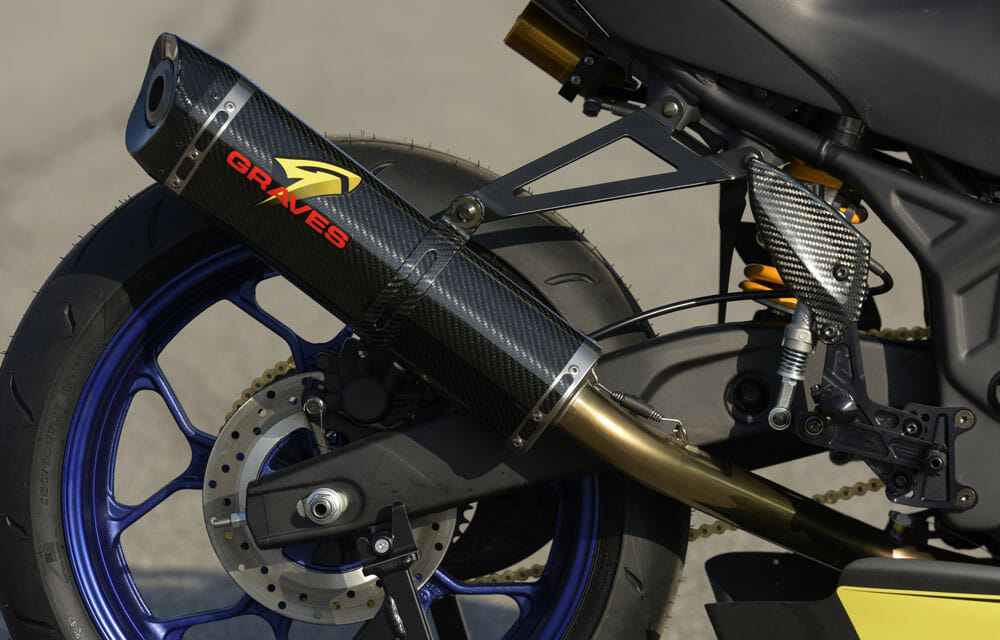 The Graves name has been synonymous in the American road-race paddock for over 20 years, and here it’s boldly placed on the carbon-fiber muffler of the company’s full-system exhaust.
The Graves name has been synonymous in the American road-race paddock for over 20 years, and here it’s boldly placed on the carbon-fiber muffler of the company’s full-system exhaust.
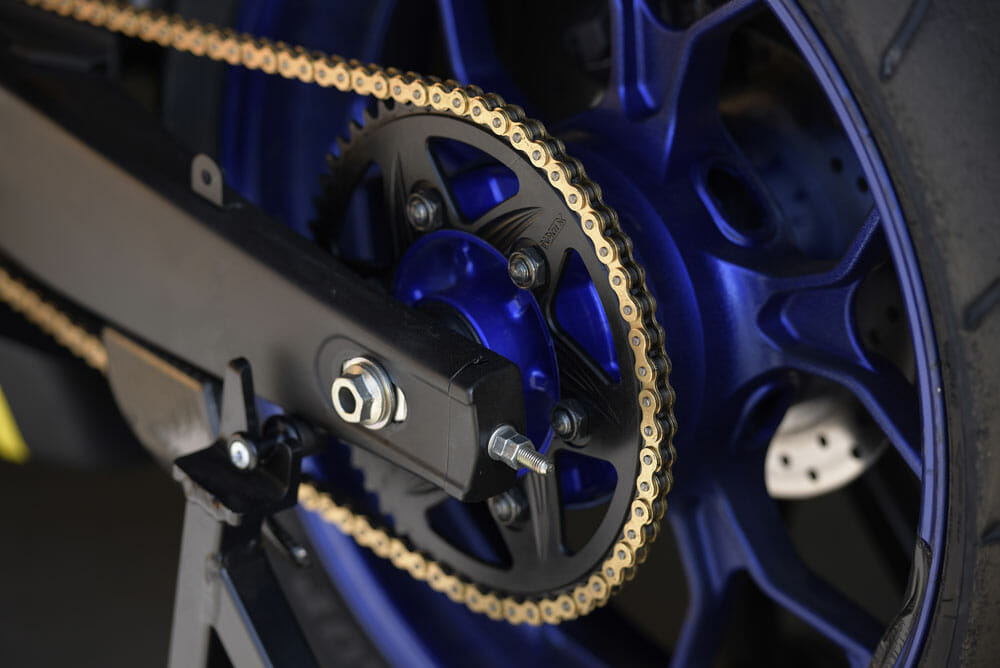 Graves opted to use a small 415 DID chain and special Vortex sprockets to consume as little power as possible, but it comes with a price—the chain is recommended to be replaced every 500km.
Graves opted to use a small 415 DID chain and special Vortex sprockets to consume as little power as possible, but it comes with a price—the chain is recommended to be replaced every 500km.
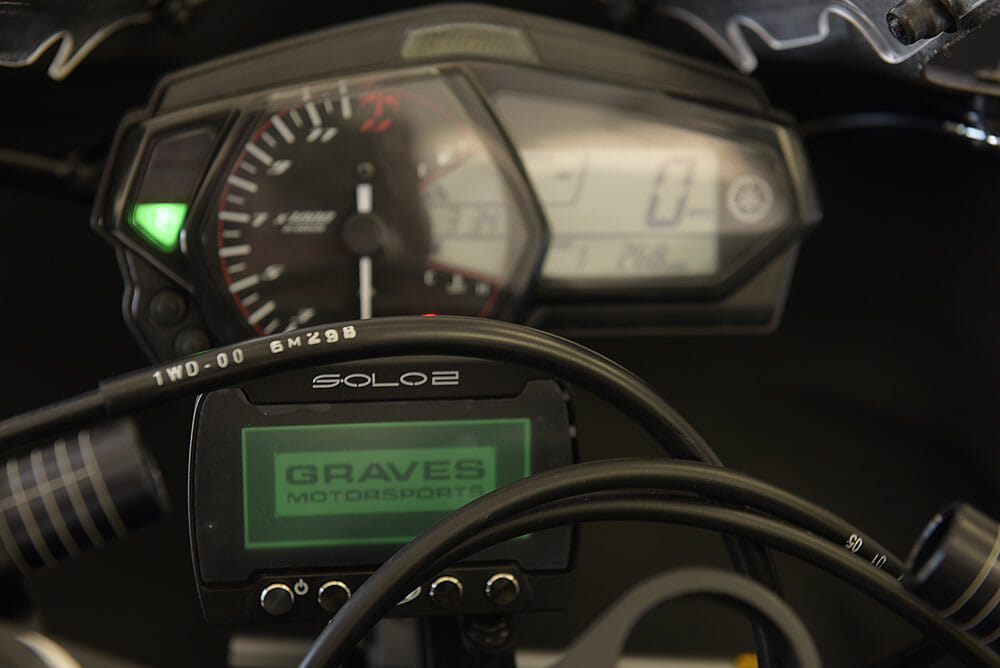 Perched atop the dash, the Graves team fitted an AIM Solo 2 GPS lap timer on each of the motorcycles. It comes equipped with a light that blinks green if you’re on your quickest lap, or red if you’re off pace.
Perched atop the dash, the Graves team fitted an AIM Solo 2 GPS lap timer on each of the motorcycles. It comes equipped with a light that blinks green if you’re on your quickest lap, or red if you’re off pace.